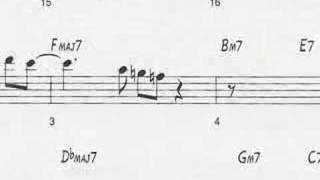| You are not logged in. | login to customize your own personal play list |
“Giant Steps” by John Coltrane |
| United States Federal Trade Commission forbids anyone under 13 from viewing these music videos! |
| You are not logged in. | login to customize your own personal play list |
“Giant Steps” by John Coltrane |
| United States Federal Trade Commission forbids anyone under 13 from viewing these music videos! |
 |
 |
 |
 |
You need Flash player 8+ and JavaScript enabled to view this video.
|
 |
 |
   |
 |

song info “Giant Steps” by John Coltrane is a jazz song. Song Title: Giant StepsArtist: John Coltrane Album: Giant Steps Genre: jazz Composer: Copyright © 1959 John Coltrane Piano: Tommy Flanagan Drums: Art Taylor Tenor saxophone: John Coltrane Double Bass: Paul Chambers Producer: Nesuhi Ertegün Recorded: May 1959 Released: 1960 Label: Atlantic Number of listens: 9255 Current rank: 2197 (updated weekly) Highest rank: 2030 (play the video all the way through to register a vote for this song) Translations courtesy of Apple and Google. |
||
Summary quotation from Wikipedia:
“Giant Steps” is a jazz composition by John Coltrane, first appearing as the first track on the album of the same name (1960). The composition contains a rapid and improvised progression of chord changes through three keys (Coltrane changes) shifted by major thirds, creating an augmented triad.
Title
The song title comes from the relatively giant leaps between the roots of consecutive chords. From a transcription, one can easily infer that many of these are upward leaps of minor thirds, but they can just as easily be inverted as descending major sixths, the latter approach best accentuating the disconcerting nature of the progression.
Recording
The original recording features Coltrane (tenor saxophone), Paul Chambers (double bass), Tommy Flanagan (piano), and Art Taylor (drums). John Coltrane was known for coming into the studio with unrehearsed songs, and “Giant Steps” was no exception. On the original recording, Tommy Flanagan (piano) played a choppy start-stop solo where it sounds like he is struggling to improvise over Coltrane changes without adequate preparation. Flanagan would revisit “Giant Steps” on several recordings later in his career and mastered the progression. In some of the alternate takes, Cedar Walton is at the piano, declining to take a solo and also playing at a slower tempo than the takes with Flanagan.
Chord progression
The saxophonist had previously used this technique on the LP Blue Train on the tunes “Moment’s Notice” and “Lazy Bird”. Coltrane continued in this vein on a recording with Cannonball Adderley of the standard “Limehouse Blues” and on his original “Fifth House”. He continued to use this approach on other tunes, such as “Countdown”, based on the Miles Davis tune “Tune Up”; “26-2” based on Charlie Parker’s “Confirmation”; and a reharmonization of the jazz standard “Body and Soul”. Songs such as “Naima” and “Like Sonny” also show some harmonic similarity to “Giant Steps”. Coltrane continued to employ similar concepts in his soloing during his more open and modal middle period. A Love Supreme features examples of lines based on “Giant Steps” cycles over modal vamps, to create a polytonal effect.
The progression continues to stimulate harmonic thinking in contemporary jazz. There are a number of different approaches to soloing on the song. While Coltrane favoured arpeggiation over the changes, other players have used different tricks and patterns to bring out the sound of the changes. The chord progression was later used by Freddie Hubbard as a basis for his composition “Dear John” (on Hubbard’s 1991 album Bolivia). Covers have been recorded by such artists as Rahsaan Roland Kirk, Pat Metheny, Buddy Rich, Jaco Pastorius, Mike Stern, Greg Howe, Tommy Flanagan (who played on the original recording), McCoy Tyner, Kenny Werner, Kenny Garrett, Woody Herman, New York Voices, and Taylor Eigsti, Gary Bartz. The song was recorded by Chaka Khan in 1982 as part of the “Be Bop Medley” from her album Chaka Khan.
—from Wikipedia (the Wikipedia:Text of Creative Commons Attribution-ShareAlike 3.0 Unported License applies to Wikipedia’s block of text and possible accompanying picture, along with any alterations, transformations, and/or building upon Wikipedia’s original text that ThisSideofSanity.com applied to this block of text)
The Americans with Disabilities Act (ADA) and U.S. Government Section 508 of the Rehabilitation Act of 1973 require that web sites provide transcripts of audio for the deaf.
We will be adding lyrics to all songs as fast as we can. Please be patient.
Onni: Giant Steps is Samantha’s favorite song.
To submit a comment, use the form below:
Please use the form (with the delay for a human to inspect it) because this website is attacked by more than 20 spam attempts per minute. The only way to keep you safe from the spam is by having human review.
 |
  |
|
If you spot an error in fact, grammar, syntax, or spelling, or a broken link, or have additional information, commentary, or constructive criticism, please contact us.
Copyright © 2014 Milo. All rights reserved. Todos Derechos Reservados. The copyrights on all source code and the data base belong to Milo and are used on this web site by permission.
The source code is at OSdata.com, released under Apache License 2.0.
Copyright 2012, 2013, 2014 Milo
Licensed under the Apache License, Version 2.0 (the “License”); you may not use this file except in compliance with the License. You may obtain a copy of the License at:
http://www.apache.org/licenses/LICENSE-2.0
Unless required by applicable law or agreed to in writing, software distributed under the License is distributed on an “AS IS” BASIS, WITHOUT WARRANTIES OR CONDITIONS OF ANY KIND, either express or implied. See the License for the specific language governing permissions and limitations under the License.
Enjoy the This Side of Sanity website Twitter feed.
Enjoy the This Side of Sanity Twitter feed.

|
player artwork by michaelm